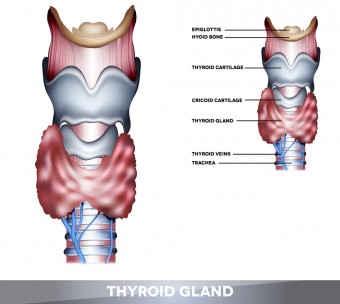Why So Many Health Issues Stem from Problems in the Thyroid
 It seems like just about everyone knows someone with a thyroid condition. Their symptoms can sometimes be wide ranging. Much like the IRS and their tax code, it can leave you a little confused about what exactly it does and why it can cause so many problems. In an effort to put this ignorance to bed, let’s take a little closer look at this inexplicable little endocrine gland.
It seems like just about everyone knows someone with a thyroid condition. Their symptoms can sometimes be wide ranging. Much like the IRS and their tax code, it can leave you a little confused about what exactly it does and why it can cause so many problems. In an effort to put this ignorance to bed, let’s take a little closer look at this inexplicable little endocrine gland.
The thyroid is the largest independent endocrine gland in the body. It’s butterfly shaped and wraps around the front part of your trachea (your wind-pipe) just below the Adam’s apple. (If you’re curious- see Why the Adam’s Apple is Called That) The thyroid secretes hormones that affect almost every cell in your body. In fact, only the adult brain, spleen, testes and uterus aren’t affected by it.
 While not strictly necessary for life, thyroid hormones perform several functions, including controlling cellular metabolism and temperature, thereby controlling your body’s metabolic rate, and its production of heat. It has a major role in regulating blood pressure and heart rate by raising the number of adrenergic receptors (the ones that stimulate your fight or flight nervous system) in your blood vessels. It also plays an important role in the development of the skeletal, nervous, and reproductive systems, while also promoting tissue growth.
While not strictly necessary for life, thyroid hormones perform several functions, including controlling cellular metabolism and temperature, thereby controlling your body’s metabolic rate, and its production of heat. It has a major role in regulating blood pressure and heart rate by raising the number of adrenergic receptors (the ones that stimulate your fight or flight nervous system) in your blood vessels. It also plays an important role in the development of the skeletal, nervous, and reproductive systems, while also promoting tissue growth.
There are two main thyroid hormones (TH) that cause all of the previous reactions. They are Thyroxine (T4) and Triiodothyronine (T3). Most of the hormones produced in the body use proteins and fats as their base chemical structure. Thyroid hormones use iodine. Thus, iodide is an extremely important nutrient to take in. The Morton Salt Company, at the request of the U.S. government, actually began adding iodine to its salt in 1924 as a way to combat iodine deficiencies and thus, thyroid problems.
The difference between the hormones is the amount of iodine molecules in them- T4 has 4, T3 has 3. There is some debate over the exact roles of these two hormones within the body. What is known is T4 is around 50 times more abundant, but T3 is about 10 times more potent in its effects.
Your thyroid hormones affect metabolism by increasing what is known as oxidative phosphorylation in your mitochondria. If that sounds like way too many syllables for one sentence, I agree. Basically, your cells use ATP (adenosine triphosphate) as an energy source to metabolize all of the nutrients your body takes in. Mitochondria make ATP. Inside your cells, thyroid hormones primarily attach to your mitochondria and signal it to either increase, or decrease ATP production. Thus, the more thyroid hormones present, the more ATP, and consequently the higher your metabolism. Increasing metabolism also increases heat production. This is how your thyroid can also control your body’s temperature.
Almost every aspect of your body’s growth is also dependent on thyroid hormones. While TH doesn’t directly affect growth itself, they signal the production of almost every type of growth factor in your body, specifically: Somatomedins, responsible for skeletal tissue growth, Erythropoietin, responsible for red blood cell development, Nerve Growth Factor, responsible for the growth of nerve cells, and Epidermal growth factor, responsible for cell growth and division. Thyroid hormones also help in the production of Prolactin, the hormone responsible for the production of milk in women.
Now that we know a little about how the thyroid affects the many functions in the body, let’s talk about the problems that can happen when this little workhorse goes haywire.
Hyperthyroidism is a condition in which the thyroid produces too much T3 and T4 for the body’s needs. The symptoms all revolve around what T3 and T4 stimulate. For instance increased metabolism, resulting in sudden weight loss, an increase in appetite, nervousness, anxiety, irritability, and sweating. They also can cause changes in menstrual cycles, increase in the frequency of bowel movements, and intolerance to heat, just to name a few.
Hypothyroidism is the exact opposite- too little production of thyroid hormones for the body’s needs. The symptoms can include: unexplained weight gain, fatigue, muscle weakness, constipation, dry skin, depression, impaired memory and lower heart rates.
There are quite a few other conditions that affect your thyroid. “Goiter” is the term used when your thyroid swells, resulting in a large growth on your neck. Iodine deficiencies are a common cause, and the result can be hypothyroidism.
The most common cause of hypothyroidism is known as Hashimoto’s thyroiditis. This is a condition in which your body’s immune system attacks the thyroid itself. Graves’ disease is also an autoimmune condition that results in over stimulating your thyroid gland and hyperthyroidism is the result.
Rarely, you can have what’s known as a thyroid storm. This causes extremely high levels of thyroid hormones and the result is severe complications that can lead to rapid heart rates, dehydration, heart failure and death.
Since thyroid problems can cause just about any symptom they have a name for, should you suspect a problem with yours, you will need to get blood tests done at your doctors. They have several different tests for finding problems here, but the most common is to measure your level of thyroid stimulating hormone (TSH).
Your pituitary gland produces this hormone in response to levels of thyroid hormone in your body. When you have low levels of thyroid hormones in your blood stream, your pituitary gland produces more TSH in an attempt to get your thyroid to produce more. So when your doctor checks your TSH level, if it’s high, you could have hypothyroidism, if too low, you could have hyperthyroidism.
Should you have a dysfunctional thyroid, your doctor’s treatment is to simply adjust its output accordingly. If you have an underperforming thyroid, your doctor could give you thyroid hormone replacement drugs like Synthriod, Levothyoid, Levoxyl, and Levothyroxine.
If you have an over-performing thyroid, the treatment involves three goals: managing symptoms like fast heart rates, increased sweating, dry eyes, and anxiety; reducing your thyroids output with medications like Tapazole, Propylthiouracil, or radioactive iodine; and, lastly, they will attempt to find and fix a cause, like Graves’ disease.
In the end, your thyroid affects almost every cell in your body. Depending on the levels of your thyroid hormones, you could have any number of unwanted side effects. If you think you have a problem with yours, treat it like problems with your taxes, go see a professional.
If you liked this article, you might also enjoy our new popular podcast, The BrainFood Show (iTunes, Spotify, Google Play Music, Feed), as well as:
- The Truth Behind Vaporizing And Inhaling Alcohol
- How, And Why, Skin Wrinkles In The Water
- How Long a Person’s Heart Has To Be Stopped Before Medics Wouldn’t Try to Revive Them
- What is Lupus?
- Does Caffeine Stunt Your Growth?
| Share the Knowledge! |
|





Thank you for the info on thyroids&the problems they can cause, I think I needed to know that
“While not strictly necessary for life, thyroid hormones perform several functions, including controlling cellular metabolism and temperature, thereby controlling your body’s metabolic rate, and its production of heat.”
Thyroid hormone is required for survival. Without these hormones, death will occur.